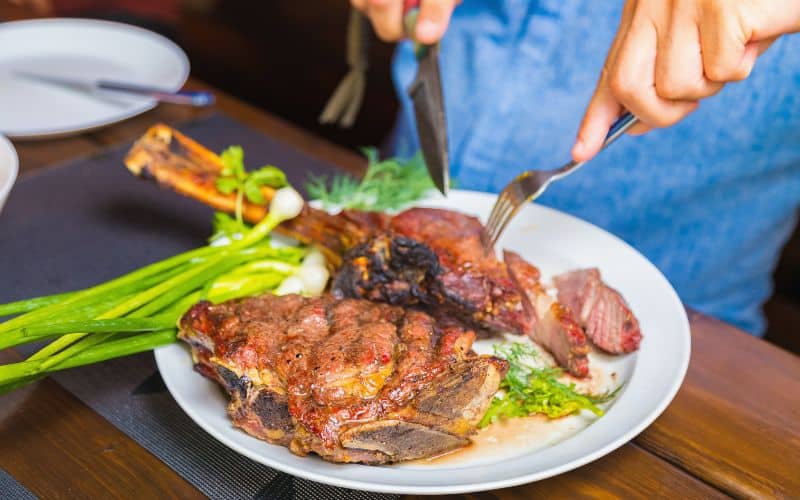The carnivore diet is a dietary approach that emphasizes consuming meat and other animal products while avoiding all plant-based foods. This diet has gained popularity in recent years due to its potential benefits, including weight loss, improved digestion, and increased energy levels. However, it is important to note that the carnivore diet is a highly restrictive diet that may not be suitable for everyone.
If you are considering the carnivore diet, it is important to understand what foods are allowed and what foods should be avoided. The diet typically includes red meat, poultry, fish, eggs, and small amounts of dairy products such as cheese and butter. However, all plant-based foods, including fruits, vegetables, grains, and legumes, are strictly prohibited. This means that the carnivore diet is a high-protein, high-fat, and low-carbohydrate diet that may be difficult to follow for some individuals.
Before starting the carnivore diet, it is important to consult with a healthcare professional to determine if it is appropriate for you. Additionally, it is important to ensure that you are getting all of the necessary nutrients and vitamins that your body needs to function properly. While the carnivore diet may offer some benefits, it is not a one-size-fits-all solution and should be approached with caution.
Contents
Understanding the Carnivore Diet

The carnivore diet is a diet that consists of eating only animal products. It is a controversial diet that has gained popularity in recent years, with proponents claiming that it can lead to weight loss, improved health, and increased energy. In this section, we will explore the origins and principles of the carnivore diet.
Origins of the Carnivore Diet
The carnivore diet is not a new concept. In fact, our ancestors were largely carnivorous, eating a diet that consisted primarily of meat. However, with the advent of agriculture, humans began to consume more grains and other plant-based foods. Proponents of the carnivore diet argue that this shift in diet has led to a host of health problems, including obesity, diabetes, and heart disease.
The modern carnivore diet can be traced back to the 1800s, when a Scottish surgeon named John Rollo began treating diabetes with a diet that consisted mainly of meat and fat. In the 1920s, another physician, Vilhjalmur Stefansson, lived with the Inuit people in Canada and subsisted almost entirely on a diet of meat, fish, and fat. He claimed that this diet was healthy and sustainable, and he wrote about his experiences in a book called "The Fat of the Land."
Principles of the Carnivore Diet
The carnivore diet is a simple diet that involves eating only animal products. This includes meat, fish, eggs, and dairy products. Proponents of the diet argue that this is the natural diet for humans and that it can lead to a host of health benefits.
One of the main principles of the carnivore diet is that it eliminates all plant-based foods, including grains, fruits, and vegetables. Proponents of the diet argue that these foods are unnecessary and can even be harmful to human health. They claim that the nutrients found in these foods can be obtained from animal products, and that plant-based foods contain anti-nutrients that can interfere with nutrient absorption.
Another principle of the carnivore diet is that it emphasizes the consumption of high-quality animal products. Proponents of the diet argue that grass-fed and pasture-raised animals are healthier and more nutritious than conventionally-raised animals. They also recommend consuming organ meats, which are rich in vitamins and minerals.
In summary, the carnivore diet is a controversial diet that involves eating only animal products. Proponents of the diet argue that it can lead to weight loss, improved health, and increased energy. The origins of the diet can be traced back to our ancestors, and the principles of the diet involve eliminating all plant-based foods and emphasizing the consumption of high-quality animal products.
Benefits of the Carnivore Diet
The carnivore diet, which involves eating only animal-based foods, has been gaining popularity in recent years. While it may seem extreme, there are several benefits to this way of eating. In this section, we will explore some of the benefits of the carnivore diet.
Weight Loss
One of the most significant benefits of the carnivore diet is weight loss. Since the diet eliminates carbohydrates and other plant-based foods, it can lead to a decrease in calorie intake. Additionally, the high protein content of animal-based foods can help increase satiety, reducing the urge to overeat. Studies have shown that low-carbohydrate diets, such as the carnivore diet, can lead to significant weight loss and improvements in body composition.
Improved Digestion
Another benefit of the carnivore diet is improved digestion. Many people who follow this way of eating report a reduction in digestive issues such as bloating, gas, and constipation. This is likely due to the elimination of plant-based foods, which can be difficult for some people to digest. Additionally, animal-based foods are rich in nutrients such as zinc and vitamin B12, which can help support digestive health.
Mental Clarity

Some people who follow the carnivore diet report an improvement in mental clarity. This may be due to the elimination of carbohydrates, which can cause blood sugar spikes and crashes that can affect cognitive function. Additionally, animal-based foods are rich in omega-3 fatty acids, which have been shown to support brain health and cognitive function.
While the carnivore diet may not be for everyone, it does offer several benefits. These include weight loss, improved digestion, and mental clarity. If you are considering trying the carnivore diet, it is important to speak with a healthcare professional to ensure that it is safe and appropriate for you.
Potential Risks of the Carnivore Diet
While the carnivore diet may have potential benefits, it also comes with some potential risks. Here are two of the main risks associated with this diet:
Nutrient Deficiencies
One of the main concerns with the carnivore diet is the risk of nutrient deficiencies. Since this diet is primarily made up of animal products, it can be low in important nutrients such as fiber, vitamins C and E, and potassium. Additionally, the carnivore diet eliminates all plant-based foods, which are important sources of phytonutrients, antioxidants, and other beneficial compounds.
To mitigate the risk of nutrient deficiencies, it's important to incorporate a variety of animal products into your diet. This can include beef, pork, chicken, fish, and organ meats. It's also important to consider taking supplements to ensure you're getting enough of certain nutrients, such as vitamin C.
Increased Cholesterol Levels
Another potential risk of the carnivore diet is an increase in cholesterol levels. Since this diet is high in saturated fat, it can raise levels of LDL or "bad" cholesterol, which can increase the risk of heart disease.
To reduce the risk of high cholesterol levels, it's important to choose leaner cuts of meat and incorporate other healthy fats into your diet, such as olive oil and avocado. It's also important to monitor your cholesterol levels regularly and speak with your healthcare provider if you have concerns.
Overall, the carnivore diet may have potential benefits, but it's important to consider the potential risks before starting this diet. By incorporating a variety of animal products into your diet and monitoring your nutrient intake and cholesterol levels, you can reduce the risk of nutrient deficiencies and high cholesterol levels.
How to Start a Carnivore Diet
If you're considering starting a carnivore diet, it's essential to understand what you can and cannot eat. The carnivore diet is a high-fat, low-carb diet that consists of eating only animal products. This means no fruits, vegetables, grains, or other plant-based foods. Here are some steps to help you get started on the carnivore diet.
Choosing the Right Meats
When starting the carnivore diet, it's crucial to choose the right meats. You should choose high-quality meats that are nutrient-dense and free from additives, hormones, and antibiotics. Here are some meats that are great for the carnivore diet:
- Beef (ground beef, steak, roast, brisket)
- Poultry (chicken, turkey, duck, goose)
- Pork (bacon, pork chops, pork loin, ham)
- Fish (salmon, tuna, sardines, mackerel)
- Organ meats (liver, heart, kidney, tongue)
It's also important to choose fatty cuts of meat. Fatty meats are more satiating and provide your body with the necessary energy to function correctly.
Meal Planning

Meal planning is crucial when starting the carnivore diet. It's essential to plan your meals to ensure that you're getting all the necessary nutrients. Here are some tips for meal planning:
- Focus on protein and fat: Your meals should consist of high-quality protein and fat. You can add some seasoning to your meat, but avoid adding any plant-based foods.
- Eat until full: You should eat until you're full and satisfied. Don't worry about counting calories or restricting your portion sizes.
- Drink water: Drink plenty of water to stay hydrated. Avoid drinking any sugary drinks or fruit juices.
- Cook your meat how you like it: You can cook your meat in any way you like, whether it's grilled, roasted, or fried.
In conclusion, starting a carnivore diet can be challenging, but with the right mindset and preparation, it can be a sustainable and healthy way of eating. Remember to choose high-quality meats, focus on protein and fat, eat until full, drink water, and cook your meat how you like it.
Maintaining the Carnivore Diet
Maintaining the carnivore diet can be challenging, but with a little bit of planning and preparation, it can be a sustainable way of eating for the long term. Here are some tips to help you maintain the carnivore diet.
Dealing with Cravings
One of the biggest challenges of the carnivore diet is dealing with cravings. Since the diet is so restrictive, it's normal to crave foods that are not allowed on the diet. Here are some tips to help you deal with cravings:
- Stay hydrated: Drinking plenty of water can help reduce cravings.
- Eat enough: Make sure you're eating enough food to feel satisfied.
- Eat fatty cuts of meat: Fatty cuts of meat can help you feel full and satisfied.
- Avoid trigger foods: If there are certain foods that trigger cravings, avoid them altogether.
Long-Term Sustainability
The carnivore diet can be sustainable in the long term if you make a few adjustments. Here are some tips to help you maintain the carnivore diet in the long term:
- Experiment with different cuts of meat: Eating the same thing every day can get boring. Experiment with different cuts of meat to keep things interesting.
- Incorporate organ meats: Organ meats are rich in nutrients and can help you meet your daily nutrient needs.
- Make sure you're getting enough fat: The carnivore diet is a high-fat diet, so make sure you're getting enough fat to feel satisfied.
- Take supplements: Since the carnivore diet is so restrictive, it can be difficult to get all the nutrients your body needs. Consider taking supplements to make sure you're meeting your daily nutrient needs.
By following these tips, you can maintain the carnivore diet and enjoy the many benefits it has to offer. Remember to listen to your body and make adjustments as needed to ensure your long-term success.
Conclusion
The carnivore diet is a highly restrictive diet that involves eating only meat and other animal-based foods. While some people may find success with this diet in terms of weight loss, it is important to consider the potential risks and drawbacks before starting.
One of the main benefits of the carnivore diet is that it can be very effective for weight loss. By eliminating carbohydrates and other plant-based foods, the body is forced to burn fat for energy, which can lead to rapid weight loss. Additionally, some people report improved digestion, increased energy levels, and reduced inflammation while on the carnivore diet.
However, there are also several risks and drawbacks associated with the carnivore diet. For one, it can be difficult to get all of the necessary nutrients from a diet that is so limited in variety. This can lead to deficiencies in key vitamins and minerals, which can have negative health effects over time.
Furthermore, the high levels of saturated fat and cholesterol in a carnivore diet can increase the risk of heart disease and other health problems. Finally, the lack of fiber in the diet can lead to constipation and other digestive issues.
Overall, while the carnivore diet may be effective for some people, it is important to approach it with caution and to consult with a healthcare professional before starting. If you do decide to try the carnivore diet, be sure to focus on high-quality, nutrient-dense sources of meat and other animal-based foods, and to listen to your body and make adjustments as necessary.
Frequently Asked Questions
What is the best food to eat on a carnivore diet?

The best foods to eat on a carnivore diet are meat, fish, and animal products. Some examples include beef, pork, chicken, salmon, eggs, and cheese. It is important to choose high-quality, nutrient-dense sources of animal products to ensure that you are getting all of the necessary nutrients.
What should I eat the first week of the carnivore diet?
During the first week of the carnivore diet, it is recommended to stick to simple meals that consist of meat, fish, and eggs. Some examples include steak, chicken breast, salmon fillet, and scrambled eggs. It is also important to drink plenty of water to stay hydrated.
How long should I do the carnivore diet?
The length of time that you should do the carnivore diet depends on your individual goals and health needs. Some people choose to do it for a few weeks or months as a way to reset their diet and improve their health, while others may choose to follow it long-term.
What do you eat on a carnivore diet?
On a carnivore diet, you primarily eat meat, fish, and animal products. Some examples include beef, pork, chicken, salmon, eggs, and cheese. It is important to choose high-quality, nutrient-dense sources of animal products to ensure that you are getting all of the necessary nutrients.
Is the carnivore diet safe?
The safety of the carnivore diet is a topic of debate among health professionals. While some people report experiencing health benefits from following the diet, others have concerns about the potential risks of consuming large amounts of animal products and not getting enough fiber and other nutrients found in plant-based foods.
What are the results of a 30-day carnivore diet?
The results of a 30-day carnivore diet vary from person to person. Some people report experiencing weight loss, improved energy levels, and better digestion, while others may not see significant changes. It is important to consult with a healthcare professional before starting any new diet to ensure that it is safe and appropriate for your individual needs.





